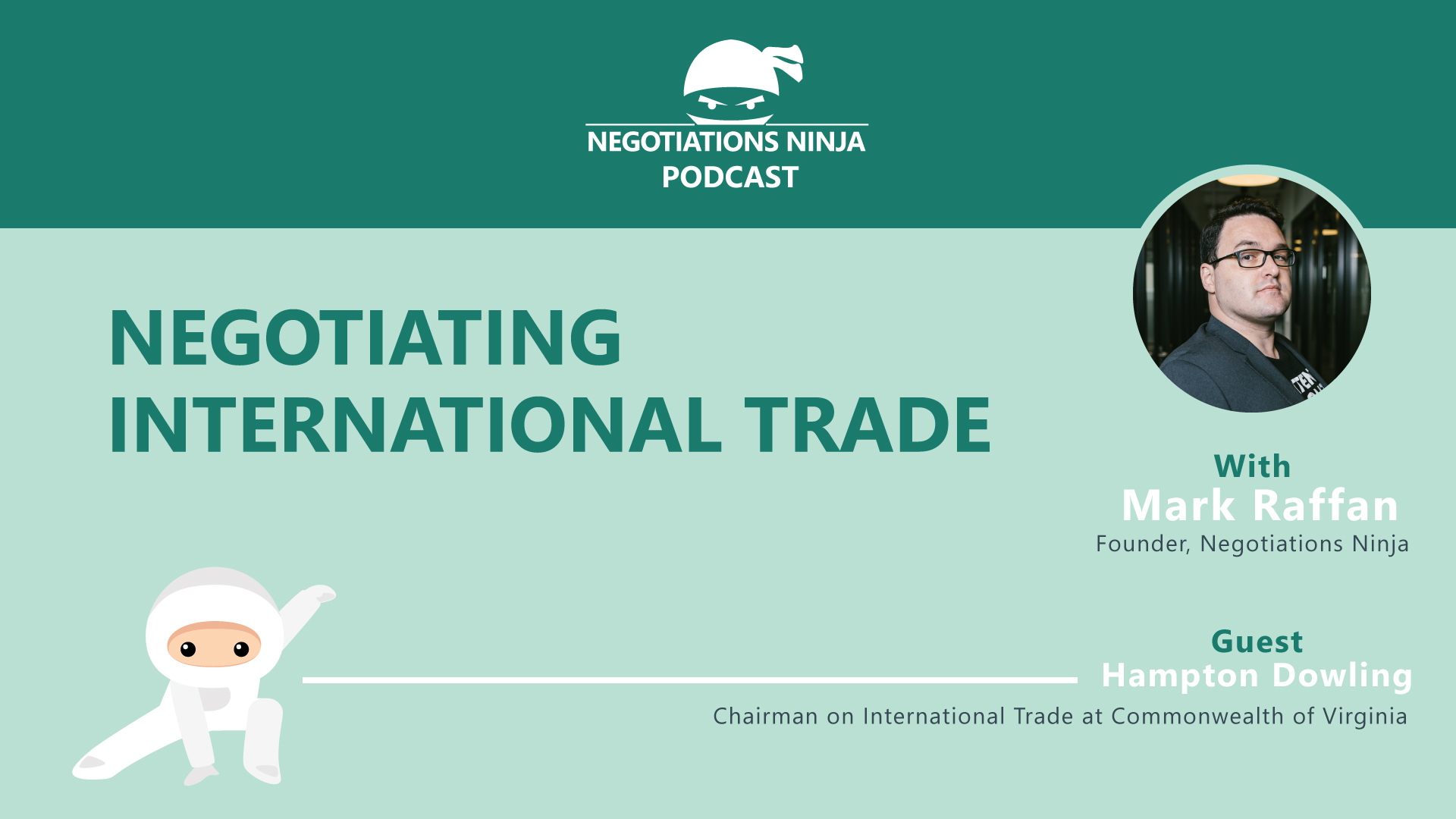SUMMARY
Brexit. The USCMA. Tariffs. The world’s most powerful trading partners. We’re chatting about international trade with none other than the great Hampton Dowling. He supports businesses, organizations, and politicians with an insider’s view as they navigate their way through large, complex international trade deals. We’re chatting about when trade and politics collide, separating people from the problem, business leaders influencing trade, and what any negotiator has to be willing to give up.
Outline of This Episode
- [2:22] Learn more about Hampton Dowling
- [8:24] How a negotiation approach impacts trade deals
- [19:05] How to separate the people from the problem
- [24:34] The influence of business leaders on international trade deals
- [29:56] Trade deals may not benefit everyone
- [34:29] What your preparation process should look like
- [42:05] How to get in touch with Hampton Dowling
How a negotiation approach impacts trade deals
From Hampton’s perspective, much of today’s public has been blocked from opportunities to see what’s going on and doesn’t understand the importance of decisions being made. Negotiations are all about positions and interests, which are inseparable. The level and the substance of what goes on in the background are important to be mindful of. What about the US and China agreement? The two countries manage over half of the world’s economy. Both nations have leading military powers. The outcome of a trade agreement between these two countries can shape tomorrow’s world.
The current administration is responsible for changing world trade. Mid-2017 they took steps to shift away from crowdsourcing and multilateral agreements to a more disciplined and artful approach to negotiating bilateral agreements. The shift in how the US approaches trade has captured everyone’s attention. Hampton emphasizes that “Negotiation is the center of any and all progress of any country that intends to do business in the United States.”
Hampton believes that political negotiations should be conducted in private just like any negotiation in the business world. There has to be a balance of constitutional requirements and the mechanics of the negotiation itself—which isn’t easy to do. It’s important to recognize the role of politics and do as much as you can behind the scenes in preparation for negotiations so activities can be tempered in advance.
How to separate the people from the problem
You can’t forget that it’s people who negotiate and communicate. People have personalities, which is part of a good negotiators toolkit. People are rarely the problem in negotiations, except perhaps in law enforcement situations. In trade agreements, people are part of the process. Ultimately, they’re the ones that make decisions. People have to demonstrate trust, intellect, cleverness, and artful speaking. They have to work the table well. The leader of the negotiating team calls the plays.
There’s a deliberate focus in negotiation to leave egos at the door to achieve the outcome that’s agreed upon in advance. You have to be careful that you don’t jeopardize the outcome, so you must avoid outshining the other party.
The influence of business leaders on international trade deals
Hampton believes that business leaders can—and should—have an enormous amount of influence. In a free-market society, the private sector drives business and bad deals have poor consequences for the private sector. The government relies on the informed perspectives of the private sector. For example, the ongoing tariffs with China had a significant impact on Virginia, which is where Hampton lives. They’re China’s largest source of soybeans. So when a tariff was put on soybeans, it affected the state immediately. They had to look at other customers.
The private sector educates negotiators on the potential implications of various negotiating points. Those conversations are held out of view but it’s done deliberately. The private sector knows there are tremendous implications from these agreements that can affect the entire supply chain and business strategy. Whether from Amazon, Walmart, or local retailers, the private sector must have a say in international trade negotiations.
Trade deals may not benefit everyone
Every participant in a negotiation is there to achieve an outcome that satisfies their objectives. The burden is placed on every participant to articulate what their objectives and expected outcomes are. In the process from there to the ultimate outcome, not everyone will get everything that they want.
The outcome depends on leverage, elasticity, what they’re willing to leave on the table or what they’ll go to the mat to obtain. Generally speaking, no matter the outcome of the trade agreement, most everyone usually comes out in better shape than they were before. Some will win more than others—and that’s just how it works.
What your preparation process should look like
Hampton’s #1 piece of advice is to do your homework. You need to understand the bigger picture and pay attention to what’s going on geographically, politically, culturally, etc. You can leverage technology to help you prepare. He recommends retaining the right talent to help you evaluate the players involved to understand their vulnerabilities. This can help you set up a game plan for your negotiation. He also implores you to practice in advance and play devil’s advocate to look for vulnerabilities. If you don’t do these things you’re setting yourself up for failure. Prepare as if your company’s survival depends on it.
What else must you incorporate in your preparation process? Listen to the whole episode to learn more from Hampton!
Resources & People Mentioned
- Getting to Yes by Roger Fisher and William Ury
- The TPP agreement
Episode Sponsor
- 2019 SCMA Conference and Awards Gala – 100 Year Celebration
- Discount Code: scma podcast
Connect with Hampton Dowling
- Connect on LinkedIn
Connect With Mark
- Follow Negotiations Ninja on Twitter: @NegotiationPod
- Connect with Mark on LinkedIn
- Follow Negotiations Ninja on LinkedIn
- Connect on Instagram: @NegotiationPod




